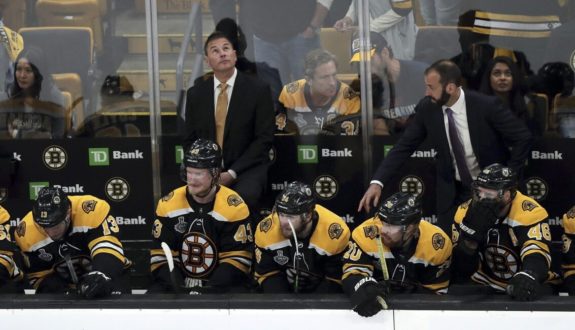David Krejci was a key component in the Boston Bruins’ 2019 playoff run.
In his first 17 games of the 2019 Stanley Cup Playoffs, the 33-year-old notched four even-strength goals and seven even-strength assists. He tallied an additional three helpers on the power play. There’s no denying that Krejci was one of Boston’s best players this postseason. However, he came up short when it mattered most.

During the Bruins’ Stanley Cup Final bout with the St. Louis Blues, the centerman tallied just two assists – one in Game 6 and the other in Game 7. He was kept off the board through the first five games of the series.
Bruins Lacked 5-on-5 Execution
For a team that was lagging behind during five-on-five play at times, Krejci kept them going. The Bruins put up 24 power play goals throughout their 24-game playoff run. Another 42 goals came at even strength.
In the Stanley Cup Final, Boston’s even-strength play was very hot and cold. They scored a minimum of three even-strength goals in Games 1, 3, and 6 – all of which resulted in wins – but were limited to just one such goal in each of the games they lost.
The Blues solved a Bruins offense that had been dominant throughout the regular season and into the playoffs. Instead, the Bruins relied on the power play which went 7-for-24 in the Final and executed on 32.4% of their chances throughout the postseason. It was a complete reversal of their Stanley Cup run in 2011 where Boston scored on just 11.4% of their power plays.

However, it wasn’t just Krejci who failed to show up during 5-on-5 play in the Final: the entire first line struggled in this regard. Brad Marchand mustered five points but put up just a goal and an assist at even strength. David Pastrnak compiled four points against St. Louis. Only one of those points – a goal – came at even strength while the rest were tallied on the power play. Patrice Bergeron also tallied four points with three coming on the power play and one shorthanded.
While he lacked execution, Krejci didn’t perform terribly against the Blues. He still looked confident with the puck and created some chances, primarily through clean zone entries – something Boston struggled to do consistently throughout their postseason run.
However, his effort only earned him a pat on the back as execution is all that matters in the playoffs. While the finger can be pointed at Krejci, those he was playing alongside may have also contributed to his woes.
DeBrusk’s Concussion & Backes’ Struggles
Jake DeBrusk found himself on the second line with Krejci throughout the 2018-19 season. The 22-year-old appeared in 68 games and put up 27 goals and 15 assists. Some of those numbers were inflated by his time on the power play where he tallied eight goals and three assists. His five-on-five success, however, was greatly due to Krejci’s 73 points this past season.
However, DeBrusk was sidelined by a concussion earlier this season. It isn’t exactly clear when the winger suffered the injury: after taking a puck to the back of the head on Nov. 26, DeBrusk played in the next four games. He then began developing symptoms and went into concussion protocol midway through the month of December.

It has recently been announced that a number of Bruins had been playing through severe injuries this postseason. Included on the list of warriors was none other than DeBrusk who was still feeling the effects of his concussion. While he appeared in all 24 of Boston’s postseason games, he only managed to register 11 points – four of which came with the man advantage. DeBrusk was still able to produce a goal and three assists during his first Stanley Cup Final, but it’s no wonder that, even with time on the power play, the forward averaged less than 15 minutes per game.
Krejci’s most consistent member on his right wing this postseason was David Backes. The veteran, who has had a disappointing career as a Bruin, only appeared in 15 games. During that time he potted just five points, resulting in him being considered a healthy scratch for Games 5, 6 and 7 of the Final.
Related: “Bruins Taking Unnecessary Risk with Backes”
While Backes provided a boost in muscle for the second line, he took away from the unit’s offensive potential. After a scoring drought dating back to Game 3 of the Eastern Conference Final against the Carolina Hurricanes, the 35-year-old was subbed out after Game 4 of the Stanley Cup Final.
The Bruins dressed seven defensemen for Game 5. Though the strategy didn’t pan out, coach Bruce Cassidy kept Backes on the sidelines for the remainder of the series and brought in rookie Karson Kuhlman. The 23-year-old tallied the first playoff goal of his career in Game 6 – assisted by Krejci. However, the Minnesota native didn’t even put a shot on net in Game 7.
Bruins Offense Often Hinges on Krejci
While Boston is able to survive without him at times, Krejci has consistently propelled the team to victory over the course of his 13 seasons with the organization. The trend seems to be that when Krejci is in prime form, the Bruins are as well.

The centerman was in that prime form throughout the B’s playoff run before drying out in the Final. It’s hard to deny the correlation between his performance and Boston’s success this postseason.
There is plenty of blame to go around for the Bruins’ shortcomings against the St. Louis Blues – it is by no means solely Krejci’s fault that the Cup wasn’t brought home to Boston. However, it’s hard not to imagine that if Krejci remained hot throughout the Final that the Bruins might have claimed their second Stanley Cup title of the decade.